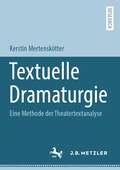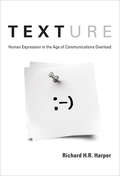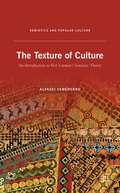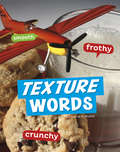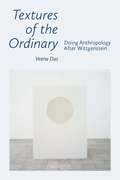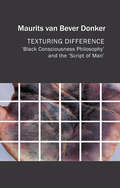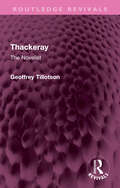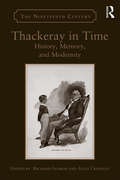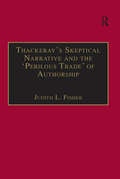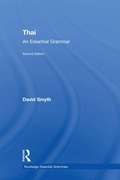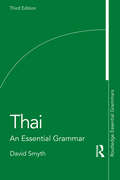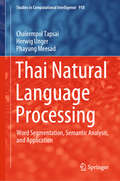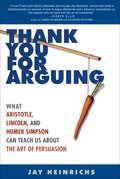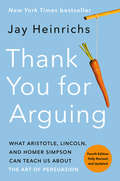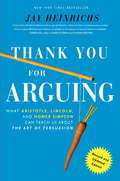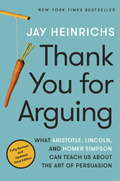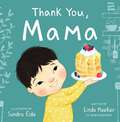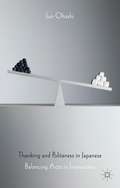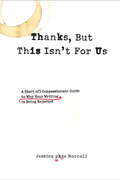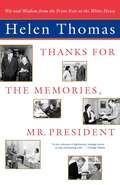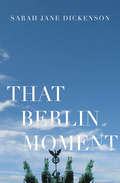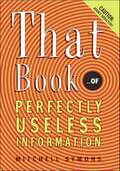- Table View
- List View
The Textualization of the Greek Alphabet
by Roger D. Woodard David A. ScottIn this book, Roger D. Woodard argues that when the Greeks first began to use the alphabet, they viewed themselves as participants in a performance phenomenon conceptually modeled on the performances of the oral poets. Since a time older than Greek antiquity, the oral poets of Indo-European tradition had been called 'weavers of words' - their extemporaneous performance of poetry was 'word weaving'. With the arrival of the new technology of the alphabet and the onset of Greek literacy, the very act of producing written symbols was interpreted as a comparable performance activity, albeit one in which almost everyone could participate, not only the select few. It was this new conceptualization of and participation in performance activity by the masses that eventually, or perhaps quickly, resulted in the demise of oral composition in performance in Greece. In conjunction with this investigation, Woodard analyzes a set of copper plaques inscribed with repeated alphabetic series and a line of what he interprets to be text, which attests to this archaic Greek conceptualization of the performance of symbol crafting.
Textuelle Dramaturgie: Eine Methode der Theatertextanalyse
by Kerstin MertenskötterEin Blick in die aktuellen Spielpläne der Theater der Gegenwart offenbart ein offenes und hetero-genes Feld an Textformen und Inszenierungsweisen. Klassische Dramen und traditionelle Insze-nierungen finden sich neben postdramatischen Arbeiten und der Ästhetik der Neudramatik. Das Postdramatische Theater und ebensolche Texte, etwa von Elfriede Jelinek, Peter Handke oder René Pollesch stehen dabei im Kontext ihrer Aufkündigung mit dem „Dreigestirn von Drama, Handlung und Nachahmung“, wie Hans-Thies Lehmann es in seiner Monografie "Postdramatisches Theater" beschreibt. Dies führt zu einer Entpersonalisierung der Figuren, zu einer Monologisierung der Dialogstruktur, zu einem Bruch mit dem Anspruch auf kausal-logische Wiedergabe eines ‚Geschehens‘. Doch die an der aristotelischen Poetik und dem Drama des 18. Jahrhunderts ausgerichtete Methode der Dramenanalyse kann (aktuelle) Theatertexte, die ohne Handlung und Figuren auskommen, nicht oder nur ex negativo erfassen. Kerstin Mertenskötter entwickelt eigene, erweiterte und revidierte literaturwissenschaftliche Analysebegriffe. Die Methode der Theatertextanalyse ermöglicht es, sowohl einen produktiven analytischen Zugang zu post- und neudramatischen Theatertexten zu erlangen, wie auch dramaturgische Verfahren in Theatertexten des 18. und 19. Jahrhunderts zu entdecken.
Texture: Human Expression in the Age of Communications Overload (The\mit Press Ser.)
by Richard H. HarperWhy we complain about communication overload even as we seek new ways to communicate.Our workdays are so filled with emails, instant messaging, and RSS feeds that we complain that there's not enough time to get our actual work done. At home, we are besieged by telephone calls on landlines and cell phones, the beeps that signal text messages, and work emails on our BlackBerrys. It's too much, we cry (or type) as we update our Facebook pages, compose a blog post, or check to see what Shaquille O'Neal has to say on Twitter. In Texture, Richard Harper asks why we seek out new ways of communicating even as we complain about communication overload.Harper describes the mistaken assumptions of developers that “more” is always better and argues that users prefer simpler technologies that allow them to create social bonds. Communication is not just the exchange of information. There is a texture to our communicative practices, manifest in the different means we choose to communicate (quick or slow, permanent or ephemeral).
The Texture of Culture
by Aleksei SemenenkoIn this introduction to the semiotic theory of one of the most innovative theorists of the twentieth century, the Russian literary scholar and semiotician Yuri Lotman, offers a new look at Lotman's profound legacy by conceptualizing his ideas in modern context and presenting them as a useful tool of cultural analysis.
Texture Words (Word Play)
by Carrie B. SheelyFluffy. Soft. Scaly. Kids encounter many textures in everyday life. Bring texture words to young learners, and watch their vocabularies grow! Words are carefully matched to engaging photos that will keep children captivated from beginning to end.
Textures of the Ordinary: Doing Anthropology after Wittgenstein (Thinking from Elsewhere)
by Veena DasHow might we speak of human life amid violence, deprivation, or disease so intrusive as to put the idea of the human into question? How can scholarship and advocacy address new forms of war or the slow, corrosive violence that belie democracy's promise to mitigate human suffering? To Veena Das, the answers to these question lie not in foundational ideas about human nature but in a close attention to the diverse ways in which the natural and the social mutually absorb each other on a daily basis. Textures of the Ordinary shows how anthropology finds a companionship with philosophy in the exploration of everyday life. Based on two decades of ethnographic work among low-income urban families in India, Das shows how the notion of texture aligns ethnography with the anthropological tone in Wittgenstein and Cavell, as well as in literary texts. Das shows that doing anthropology after Wittgenstein does not consist in taking over a new set of terms such as forms of life, language games, or private language from Wittgenstein’s philosophy. Instead, we must learn to see what eludes us in the everyday precisely because it is before our eyes. The book shows different routes of return to the everyday as it is corroded not only by catastrophic events but also by repetitive and routine violence within everyday life itself. As an alternative to normative ethics, this book develops ordinary ethics as attentiveness to the other and as the ability of small acts of care to stand up to horrific violence.Textures of the Ordinary offers a model of thinking in which concepts and experience are shown to be mutually vulnerable. With questions returned to repeatedly throughout the text and over a lifetime, this book is an intellectually intimate invitation into the ordinary, that which is most simple yet most difficult to perceive in our lives.
Texturing Difference: "Black Consciousness Philosophy" and the "Script of Man" (Critical South)
by Maurits van Bever DonkerThis book situates the nuanced intervention of the Black Consciousness Movement in South Africa within the international conjuncture of anti-colonial thought and decolonization. It argues that the Black Consciousness Movement, in addition to its urgent political focus, should also be read as a philosophical intervention on the problem of Man that haunts the idea of race. As Steve Biko once famously said, apartheid will end; the real question is what comes after apartheid. Maurits van Bever Donker argues that the Black Consciousness Movement found intellectual and conceptual allies in the writings of Frantz Fanon and Aimé Césaire, tracing the problem of race as foundational to what is called ‘the script of Man’ and, in the process, inventing the possibility of a new sense of Man, one with ‘a more human face’. While the work of figures like Biko, Fanon and Césaire tends to be read as discrete political texts in a broader field of negritude and radical black thought, Texturing Difference explores what becomes possible when this network of texts is read from the perspective of South Africa. This intervention has significance, not only for how race is approached and understood in South Africa, but for the global workings of race in our time.
Thackeray: The Novelist (Routledge Revivals)
by Geoffrey TillotsonFirst published in 1954, Thackeray is intended as a reminder that Thackeray is, after all, a great novelist. Professor Tillotson, admiring the novels as great literature, explores their common characteristics and those they share with the rest of Thackeray’s writings – for he sees Thackeray’s work as all of a piece. He is particularly interested in Thackeray’s methods of narration and in the philosophic commentary which forms a sort of trellis for almost everything he put out. He sees him mainly as a writer who, subtle as he is, address himself to readers honoured as ordinary human beings. In two appendices, Professor Tillotson deals with two particular modern opinions – that Thackeray spoiled his novels by an ‘infiltration’ into them of his own biography, and that he has no place in the great novel tradition. This book will be of interest to students of literature and history.
Thackeray in Time: History, Memory, and Modernity (The Nineteenth Century Series)
by Richard Salmon Alice CrossleyAn intense fascination with the experience of time has long been recognised as a distinctive feature of the writing of William Makepeace Thackeray (1811–1863). This collection of essays, however, represents the first sustained critical examination of Thackeray's 'time consciousness' in all its varied manifestations. Encompassing the full chronological span of the author's career and a wide range of literary forms and genres in which he worked, Thackeray in Time repositions Thackeray's temporal and historical self-consciousness in relation to the broader socio-cultural contexts of Victorian modernity. The first part of the collection focusses on some of the characteristic temporal modes of professional authorship and print culture in the mid-nineteenth century, including periodical journalism and the Christmas book market. Secondly, the volume offers fresh approaches to Thackeray's acknowledged status as a major exponent of historical fiction, reconsidering questions of historiography and the representation of place in such novels as Vanity Fair and Henry Esmond. The final part of the collection develops the central Thackerayan theme of memory within four very different but complementary contexts. Thackeray's absorption by memories of childhood in later life leads on to his own subsequent memorialisation by familial descendants and to the potential of digital technology for preserving and enhancing Thackeray's print archive in the future, and finally to the critical legacy perpetuated by generations of literary scholars since his death.
Thackeray’s Skeptical Narrative and the ‘Perilous Trade’ of Authorship (The Nineteenth Century Series)
by Judith L. FisherDrawing on the rhetorical work of James Phelan, Wayne Booth's ethical criticism, recent work on William Makepeace Thackeray, as well as an understanding of the role of skepticism in eighteenth- and nineteenth-century English thought, Thackeray's Skeptical Narrative and the "Perilous Trade" of Authorship makes a substantial contribution to nineteenth-century reading practices, as well as narratology in general. Judith Fisher combines in this study rhetorical and ethical analysis of Thackeray's narrative techniques to trace how his fiction develops to educate his reader into what she terms a "hermeneutic of skepticism." This is a kind of poised reading which enables his readers to integrate his fiction into their life in what Thackeray called "a world without God" without becoming pessimistic or fatalistic. Although Thackeray's narrative strategies have been the subject of study, most have focused on Vanity Fair and Henry Esmond only, and none look as closely as does this study at actual rhetorical techniques such as his use of pronominalization to interpolate the reader into his skeptical discourse. Fisher also brings her analysis to bear on The Adventures of Philip and The Virginians, Thackeray's last two complete novels, both of which were critical failures even as contemporary critics acknowledged their stylistic excellence. This is the first study to attempt to understand the puzzle of those two books; Fisher recovers them from their marginalized position in Thackeray's oeuvre. Fisher expertly weaves an accessible narrative theory with thoroughgoing knowledge of Thackeray's life in an integrated reading of his entire works. Reading Thackeray holistically in spite of his own disruptive practices, she does full justice to his critical skepticism while elucidating his canon for a new readership.
Thai: An Essential Grammar (Routledge Essential Grammars)
by David SmythThis second edition of Thai: An Essential Grammar provides an up-to-date and concise reference guide to Thai grammar. Using clear, jargon-free explanations, it sets out the complexities of Thai in short, readable sections and presents an accessible description of the language. Focus is kept on the real patterns of use today and grammar forms are demonstrated through a wide range of relevant examples. No prior knowledge is assumed on the part of the reader. Features include: Coverage of crucial topics, such as sentence particles, negation, questions and quantification Examples given in both Thai script and romanised transliteration Pronunciation section Guidance on speech conventions and the Thai writing system Glossary of grammatical terms Two appendices covering Romanisation systems and three key verbs Bibliography This unique reference work will prove invaluable to all learners looking to master the grammar of Thai. It is ideal either for independent study or for students in schools, colleges, universities and adult classes of all types.
Thai: An Essential Grammar (Routledge Essential Grammars)
by David SmythThis third edition of Thai: An Essential Grammar provides an up-to-date and concise reference guide to Thai grammar.Using clear, jargon-free explanations, it sets out the complexities of Thai in short, readable sections and presents an accessible description of the language. Focus is kept on the real patterns of use today and grammar forms are demonstrated through a wide range of relevant examples. No prior knowledge is assumed on the part of the reader.Features include: coverage of crucial topics, such as sentence particles, negation, questions and quantification examples given in both Thai script and romanised transliteration pronunciation section guidance on speech conventions and the Thai writing system glossary of grammatical terms two appendices covering romanisation systems and three key verbs bibliography This unique reference work will prove invaluable to all learners looking to master the grammar of Thai. It is ideal for both independent study and for students in schools, colleges, universities and adult classes of all types.
Thai Natural Language Processing: Word Segmentation, Semantic Analysis, and Application (Studies in Computational Intelligence #918)
by Chalermpol Tapsai Herwig Unger Phayung MeesadThis book presents comprehensive solutions for readers wanting to develop their own Natural Language Processing projects for the Thai language. Starting from the fundamental principles of Thai, it discusses each step in Natural Language Processing, and the real-world applications. In addition to theory, it also includes practical workshops for readers new to the field who want to start programming in Natural Language Processing. Moreover, it features a number of new techniques to provide readers with ideas for developing their own projects. The book details Thai words using phonetic annotation and also includes English definitions to help readers understand the content.
Thalia Delighting in Song
by Bonnie Maclachlan Emmet I. RobbinsEmmet I. Robbins earned an international reputation as a scholar of ancient Greek poetry, possessing a broad cultural background and a command of many languages that allowed him to present sensitive and informed readings of poets from Homer to the tragedians. Thalia Delighting in Song assembles for the first time his work from 1975 through 1999, reflecting his close reading of the Greek texts and his firm grasp of their literary, historical and mythological contexts.Among the essays included in this volume are important reflections on the poetry of Homer, Alcman, Sappho, Pindar and Aeschylus. Also featured are Robbins' writings that situate Greek texts in their wider contexts, comparing Greek poetry and modern opera, for example, or assessing the enduring influence of myth in the Indo-European traditions, accounting for links between Greek literature and the poetry, sagas and songs of several other cultures. Thalia Delighting in Song ensures that the next generation of Classicists will continue to benefit from the insights of one of the foremost scholars in the field.
Thamizh (Tamil) 10th Standard - Tamilnadu Board
by State Council of Educational Research TrainingTamil Textbook for the 10th Standard Students, preparing for Tamil Nadu State Board Exam.
Thank You for Arguing: What Aristotle, Eminem and Homer (Simpson) Can Teach Us About the Art of Persuasion
by Jay HeinrichsThank You for Arguing is your master class in the art of persuasion, taught by professors ranging from Bart Simpson to Winston Churchill. The time-tested secrets the book discloses include Cicero's three-step strategy for moving an audience to action as well as Honest Abe's Shameless Trick of lowering an audience's expectations by pretending to be unpolished. But it's also replete with contemporary techniques such as politicians' use of "code" language to appeal to specific groups and an eye-opening assortment of popular-culture dodges, including: The Eddie Haskell Ploy; Eminem's Rules of Decorum; The Belushi Paradigm; Stalin's Timing Secret; The Yoda Technique. Whether you're an inveterate lover of language books or just want to win a lot more anger-free arguments on the page, at the podium, or over a beer, Thank You for Arguing is for you. Written by one of today's most popular online language mavens, it's warm, witty, erudite, and truly enlightening. It not only teaches you how to recognize a paralipsis and a chiasmus when you hear them, but also how to wield such handy and persuasive weapons the next time you really, really want to get your own way.
Thank You for Arguing, Fourth Edition (Revised and Updated): What Aristotle, Lincoln, and Homer Simpson Can Teach Us About the Art of Persuasion
by Jay HeinrichsThe definitive guide to getting your way, revised and updated with new material on writing, speaking, framing, and other key tools for arguing more powerfully &“Cross Cicero with David Letterman and you get Jay Heinrichs.&”—Joseph Ellis, Pulitzer Prize–winning author of The Quartet and American Sphinx Now in its fourth edition, Jay Heinrichs&’s Thank You for Arguing is your master class in the art of persuasion, taught by history&’s greatest professors, ranging from Queen Victoria and Winston Churchill to Homer Simpson and Barack Obama. Filled with time-tested secrets for emerging victorious from any dispute, including Cicero&’s three-step strategy for inspiring action and Honest Abe&’s Shameless Trick for lowering an audience&’s expectations, this fascinating book also includes an assortment of persuasion tips, such as: • The Chandler Bing Adjustment: Match your argument to your audience (that is, persuasion is not about you).• The Belushi Paradigm: Before people will follow you, they have to consider you worth following. • The Yoda Technique: Transform a banal idiom by switching the words around. Additionally, Heinrichs considers the dark arts of persuasion, such as politicians&’ use of coded language to appeal to specific groups. His sage guide has been fully updated to address our culture of &“fake news&” and political polarization. Whether you&’re a lover of language books or just want to win more anger-free arguments on the page, at the podium, or over a beer, Thank You for Arguing is for you. Warm, witty, and truly enlightening, it not only teaches you how to identify a paraleipsis when you hear it but also how to wield such persuasive weapons the next time you really, really need to get your way. This expanded edition also includes a new chapter on how to reset your audience&’s priorities, as well as new and improved ArgueLab games to hone your skills.
Thank You For Arguing, Revised and Updated Edition
by Jay HeinrichsFor when you really have to get your point across... *Expanded and Revised: Including new chapters on leadership, Obama's oratorical mastery, the pitfalls of apologies--and an "Argument Lab" section to put your new skills to the test.* Thank You for Arguing is your master class in the art of persuasion, taught by professors ranging from Bart Simpson to Winston Churchill. The time-tested secrets this book discloses include Cicero's three-step strategy for moving an audience to action--as well as Honest Abe's Shameless Trick of lowering an audience's expectations by pretending to be unpolished. But it's also replete with contemporary techniques such as politicians' use of "code" language to appeal to specific groups and an eye-opening assortment of popular-culture dodges--including The Yoda Technique, The Belushi Paradigm, and The Eddie Haskell Ploy. Whether you're an inveterate lover of language books or just want to win a lot more anger-free arguments on the page, at the podium, or over a beer, Thank You for Arguing is for you. Written by one of today's most popular language mavens, it's warm, witty, erudite, and truly enlightening. It not only teaches you how to recognize a paralipsis and a chiasmus when you hear them, but also how to wield such handy and persuasive weapons the next time you really, really want to get your own way.
Thank You for Arguing, Third Edition
by Jay HeinrichsA master class in the art of persuasion, as taught by professors ranging from Bart Simpson to Winston Churchill, newly revised and updated. The time-tested secrets taught in this book include Cicero's three-step strategy for moving an audience to action, and Honest Abe's Shameless Trick for lowering an audience's expectations. And it's also replete with contemporary techniques such as politicians' use of code language to appeal to specfic groups and an eye-opening assortment of persuasive tricks, including the Eddie Haskell Ploy, the Belushi Paradigm, Stalin's Timing Secret, and the Yoda Technique. Whether you're an inveterate lover of language books or just want to win a lot more anger-free arguments on the page, at the podium, or over a beer, Thank You for Arguing is for you. Warm, witty, erudite, and truly enlightening, it not only teaches you how to recognize a paralipsis when you hear it, but also how to wield the weapons of persuasion the next time you really, really, want to get your own way.
Thank You, Mama (Grey & Mama)
by Linda MeekerTikTok and viral video star Grey (@greyandmama) says "Thank you, Mama!" to healthy foods in this picture book that teaches gratitude, manners, and the joy of sharing meals with those we love.We all want to raise happy eaters who enjoy trying new foods, mealtimes with family, and being thankful. That's why so many parents love Linda Meeker's charming videos of her son Grey saying "Thank you, Mama!" With colorful illustrations that capture a child's daily snacks and mealtimes, Thank You, Mama will delight parents and kids alike as it follows a little boy exploring different foods—from vegetables to sushi—and trying to pick his favorite.This playful picture book for 3- to 7-year-oldsencourages children to try new foods and become happy, healthy eatershonors the bond between parent and childmodels respect, manners, and thankfulnessbuilds vocabulary and prereading skills with colorful food illustrations paired with words for each itemThis debut children's book from TikTok and Instagram stars Grey and Mama (@greyandmama, 7M followers) is the perfect story forParents and grandparents who want to instill good habits and gratitude from a young ageAny family eager to celebrate the love of food and family that develops over shared mealsBaby showers, birthdays, holiday gift giving, or to a little one scared to try new foodsThis cheerful story about an adorable, curious, and kind child will have your kids saying "thank you"—and maybe even giving those peas a chance!
Thanking and Politeness in Japanese
by Jun OhashiThis book synthesizes previous work on thanking, politeness and Japanese pragmatics and crystallises the theoretical underpinnings of thanking, how it is realized linguistically and the social meaning and significance of this aspect of Japanese communication.
Thanks, But This Isn't for Us
by Morrell Jessica PageA fun, practical guide that reveals the essentials of good fiction and memoir writing by exposing the most common mistakes literary writers make. All great works of fiction and memoir are unique-but most bad novels, stories, and memoirs have a lot in common. From clunky dialogue to poorly sketchedout characters, sagging pacing to exaggerated prose, these beginners' mistakes drive any agent or editor to their stock rejection letter, telling the aspiring writer "Thanks, but this isn't for us," and leaving many to wonder what exactly it is that they're doing wrong. Veteran writing coach, developmental editor, and writing instructor Jessica Page Morrell will fill in the gaps in every rejection letter you've ever received. In Thanks, But This Isn't for Us, Morrell uses her years of experience to isolate the specific errors beginners make, including the pitfalls of unrealistic dialogue, failing to "show, not tell," and over-the-top plot twists. These are just a few of the problems that keep writers from breaking through with their work. Sympathetic and humane, but pulling no punches, Thanks, But This Isn't for Us shows writers precisely where they've gone wrong and how to get on the right track. In sixteen to-the-point chapters, with checklists, exercises, takeaway tips, and a glossary, Morrell helps readers transcend these mistakes so that they don't have to learn the hard way: with another rejection letter. .
Thanks for the Memories, Mr. President
by Helen ThomasIn a natural follow-up to her national bestseller Front Row at the White House, the dean of the White House press corps presents a vivid and personal presidential chronicle. Currently a columnist for Hearst and a former White House bureau chief for UPI, Helen Thomas has covered an unprecedented nine presidential administrations, endearing herself with her trademark "Thank you, Mr. President," at the conclusion of White House press conferences. Thomas has amassed many wonderful tales about her personal interactions with and observations of the presidents and their families that can all be found in Thanks for the Memories, Mr. President. In nine riveting chapters -- one for each administration -- Thomas delights, informs, spins yarns, and offers opinions on the commanders in chief, from Kennedy through George W. Bush. In these accounts, Thomas reveals Kennedy's love of sparring with the press, the unique invitation LBJ extended to Hubert Humphrey to become his running mate, and Reagan's down-home ways of avoiding the press's tougher questions. This book is as entertaining and compelling as Helen Thomas herself.
That Berlin Moment
by Sarah Jane DickensonBold, challenging and compelling That Berlin Moment is a play for four adult characters, two female and two male, which explores how memory is more about the present and the future than the past. 'Why don't I feel husband? I look at you and I don't feel husband, I smell you and I don't smell husband, I look at you and I -' A tragic accident has robbed Alex of her memory. Her attentive husband is eager to fill the gaps for her. But the more he tells her the more she hates who he tells her she is. Determined not to remember at all costs and with the help of a young doctor with a head full of maverick theories and a very new stethoscope, she agrees to meet the mysterious fellow patient, Stranger. Together they begin to explore and enjoy the present, but it soon becomes clear that his memories won't stay forgotten with terrifying consequences for both them and the Doctor.
That Book: ...of Perfectly Useless Information
by Mitchell SymonsDid you know that . . .John Wayne once won the dog Lassie from its owner in a poker game?Hijinks is the only word in the English language with three dotted letters in a row?The shortest war in history, between England and Zanzibar in 1896, lasted only thirty-eight minutes?Want to learn which U.S. president was a descendant of King Edward III? Or which famous people lived to read their own obituaries? Then That Book is the book for you! From history to science to pop culture, here is an irresistible, enlightening, and absolutely addictive treasure trove of fascinating and fun little-known facts that no one needs to know—an indispensable boon to every true lover of trivia and marvelous minutia!

